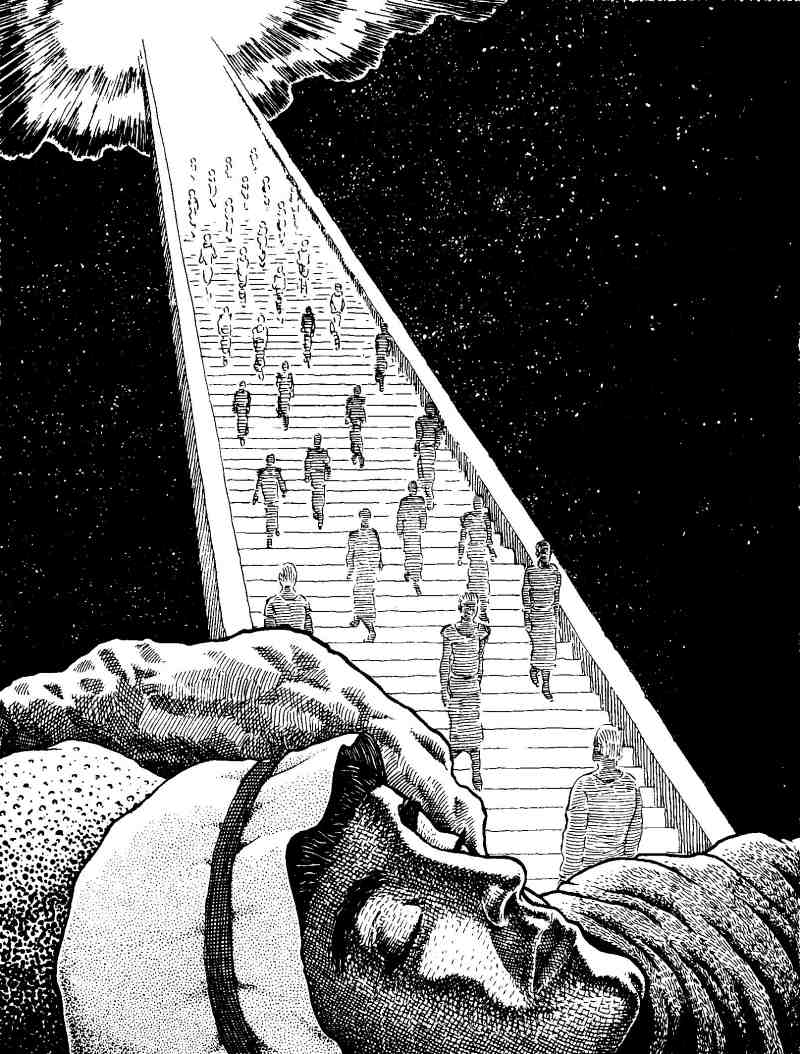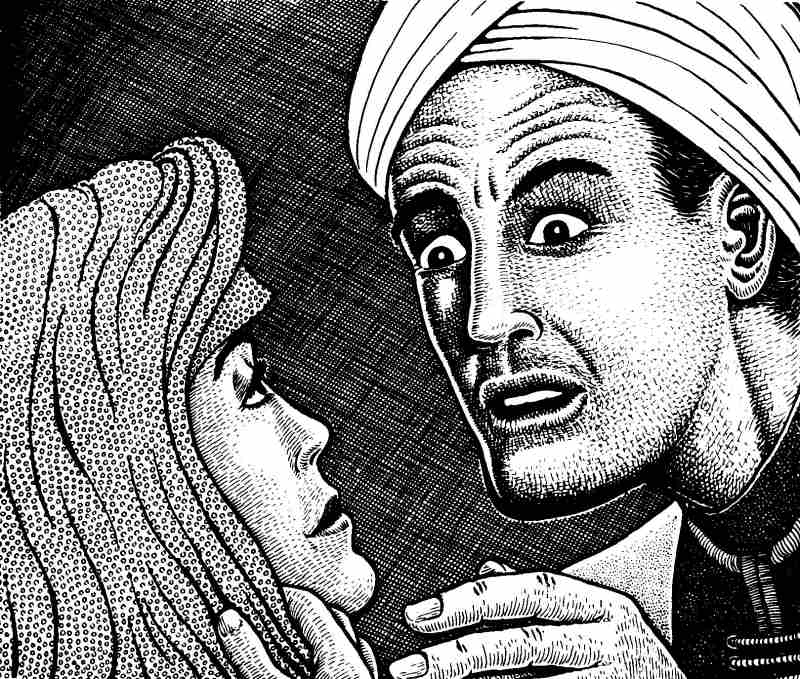JACOB'S efforts to escape his angry brother, Esau, were in vain. Esau didn't pursue him after all. Instead, he tried to please his parents, after leaving his first two wives, by marrying a third who wasn't a Canaanite. Unfortunately, she was from Ishmael's family. That still wasn't very pleasing to Isaac and Rebekah. (Gen. 28:6-9)
Jacob Stops at Bethel
After Jacob had left for Haran, one of his first stops was on a lonely, rock-covered mountain slope. There he slept on the ground with his head resting against one of the stones. He was very weary because of the long walk during the day, but instead of sleeping deeply, he had a strange dream. He dreamed of a huge stairway leading from the Earth to very high into the sky. Many angels moved up and down the stairway, at the top of which stood a powerful looking being.
"I am the God of Abraham and Isaac," came a voice from the Figure at the top of the stairway. "I will go with you on your trip, and I will protect you. The land on which you lie will become yours, and those who come after you will own it. They will spread out over the Earth, and through them all nations will receive a blessing. I will bring you safely back to this land again. I will keep all the promises I am making to you now." (Gen. 28:13-15)
When Jacob awakened from the dream, he was filled with a strange fear. He realized that God had spoken to him for the first time. The unusual experience left him weak and trembling. (Verses 16 and 17) He felt that this was such an important event in his life that he should mark the spot where the dream occurred. He anointed the stone against which he had rested, and set it up like a pillar as a special landmark. He was so thankful for God's promises to protect and provide for him that he promised to give God a tenth of all that came to him. (Gen. 28:18-22)
|
Using a stone for a pillow,
the weary Jacob dreamed of a huge stairway leading from heaven to earth.
 |
Jacob knew that the first tenth of what anyone earns should be returned to God. After all, God owns all things. Whatever man has comes to him as gifts from his Creator. Even the air he breathes is a wonderful gift, because it keeps him alive. In asking man to give back only a tenth of what he earns, God is being very generous. Besides, He promises that He will provide well for those who are faithful in giving back a tithe, or tenth. (Mal. 3:8-11)
Jacob Falls in Love
With the pleasant knowledge that from there on God would protect him, Jacob proceeded eastward. After days of trudging over stony mountain trails and hot desert sands, wading through creeks and crossing the great Euphrates River, he came to the land of Mesopotamia.
One day when he was approaching a city, he noticed some shepherds and their flocks of sheep gathered about a well that was protected by a large, flat rock. Jacob went up to the men and asked them where they were from.
"We're from Haran," they answered, pointing to the city in the distance. (Gen. 29:1-4)
Jacob was happy to learn that his long, wearying trip was about at an end. Then, on inquiring about his mother's brother, Laban, he was surprised to learn that Laban lived nearby, and that his daughter, Rachel, was at the moment approaching the well with some of Laban's sheep. (Verses 4-6)
Jacob was anxious to meet one of his own family alone. It was such a special event that he didn't want strangers around. He politely inquired of the shepherds why their flocks weren't out in the pastures grazing. When told that all the animals had to be watered at one time, Jacob started helping the men move the stone cover from the well. By this time Rachel had arrived. Jacob couldn't help noticing how beautiful she was. After he had drawn up water for her sheep, he stepped up to her and kissed her. (Verses 9-11)
"I am Jacob, your cousin," he informed the startled young woman. "My mother is Rebekah, your aunt."
Rachel was so surprised and pleased that she took her sheep and hurried to tell her father about Jacob. This gave Jacob a chance to shed some tears of thankfulness and joy because of God leading him to his people.
When Rachel's father heard about Jacob, he hurried out to meet him and welcome him to Laban's home.
Jacob visited with his uncle's family for a month. During that time he did his part in the work that had to be done around Laban's home and in the fields. The more he saw of Rachel, the more he cared for her. She had an older sister, Leah, who was closer to Jacob's age, but Jacob was interested only in Rachel.
Laban could see that Jacob could be a profitable addition to the family. He couldn't expect Jacob to keep on working, however, for only food and lodging. (Verses 12-14)
"If you wish to keep on working here, I would like to pay you fair wages," Laban told Jacob. "Tell me what you think would be fair pay."
"I shall work for the next seven years for you if you will then give me Rachel for my wife," was Jacob's surprising answer. (Verse 18)
Laban was of course pleased. Seven whole years of service from a good worker was like an offer of much money. Laban agreed, but only after purposely hesitating. He didn't want it obvious that he was elated at this bargain.
Jacob Marries Someone Else!
Seven years can be a long time. For Jacob, who was happy in seeing Rachel every day, the months went by quickly. When at last it was time for the marriage, Laban gave a feast that lasted a week. It was a time of great celebration by many people in that area.
At the time of the ceremony, Jacob's bride wore a long, heavy veil that hid her almost from view. Jacob was very happy. He felt that it was well worth seven years of labor to finally have Rachel for his wife. Later, when the veil was removed so that he could look on the woman he had married, his happiness suddenly left him.
His bride wasn't Rachel. She was Leah! (Gen. 29:20-25)
Filled with anger, Jacob went at once to Laban.
"Why have you cheated me this way?" he demanded. "You know I didn't ask to marry Leah! I asked for Rachel!"
"I'm sorry, my nephew," Laban explained, "but in this land it's a custom that the older daughter must marry first. I can't change the custom. I had to give you Leah."
If Laban had been fair, he would have told Jacob about the custom. What he really wanted was to get Leah married, and he chose a dishonest way to do it.
Jacob was disappointed and bitter. This trick by his uncle reminded him of the way he had tricked his brother and his father in order to obtain the birthright and a special blessing. Perhaps he then realized that it was just that he should be the victim of a dishonest act. Later, he was surprised at what Laban had to say.
"If you feel that only Rachel should be your wife, I will give her to you if you will do two things," Laban told Jacob.
"But Leah is my wife," Jacob said. "What two things could change that?"
"If you will be a good husband to Leah for the rest of the marriage feast this week, then I shall see that you will be married to Rachel at the end of the week," Laban replied.
"I am willing to be a good husband to whomever is my wife," Jacob said. "That is the answer to one thing you ask. What is the other thing?"

The bride drew back her heavy veil, and Jacob was amazed to see
that he had married Leah — not Rachel!
|
"You must work for me seven years more for Rachel," Laban replied.
Jacob was 'stunned by Laban's words. For a while he said nothing, leaving Laban to wonder if he had asked too much of Jacob.
"I agree to those terms," Jacob finally replied. "Rachel is worth more to me than fourteen years of work." (Verses 27-28)
Perhaps the remainder of the seven days of feasting seemed almost as long to Jacob as were the first seven years of service to his uncle. At the end of the week, he and Rachel were married. Thus he had two wives, which was a common thing in those times. Rachel was the one he loved, however.
Jacob carried out his promise to work seven more years for Laban whose scheme to marry off both his daughters later brought grief to this deceitful man.
Six More Years of Work
By the time his fourteen years of labor for Laban were finished, Jacob had little more than a large family and tents to live in. As it happened, only one son of his eleven boys was born through Rachel. Meanwhile, because of Jacob's careful planning and willingness to work hard, Laban became wealthy in sheep and cattle. Jacob couldn't see a very profitable future for himself in keeping this up. He told Laban that he wished to take his family and go back to Canaan to visit his elderly father. This worried Laban, who didn't want to lose such a valuable man.
"If you will continue working for me," Laban told Jacob, "I shall pay you any wage you ask."
"I don't want wages," Jacob said. "I'll look after your animals for a while longer if you will give me those with spots or ring marks on their hides."
Jacob was surprised that Laban agreed at once on this arrangement. (Gen. 30:25-32) Next day he found out why. Laban had his workmen and sons quickly remove and take away most of the animals Jacob had asked for. (Verses 35-36) Jacob had counted on taking sizeable flocks and herds with him back to Canaan. Now he would have to wait for more of those kinds of animals to be born.
God had promised Jacob that He would look out for him. God had kept that promise. During the next six years that Jacob continued to take care of Laban's animals, God miraculously increased the animals with spots or rings. So many of the cattle, sheep and goats became Jacob's, having come mostly from the small number Laban had allowed him to have, that Jacob became a wealthy stockman in those last few years with Laban. By careful trading and buying, he also acquired many camels, burros, tents and other expensive equipment.
At the same time, Laban's animals weren't increasing as he wanted them to. It had long been plain to Jacob's uncle that he had become prosperous because a man who relied on God was managing his business. But now that Jacob was prospering, Laban wasn't pleased. He feared that Jacob would leave him at any time.